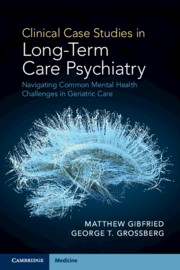 Clinical Case Studies in Long-Term Care Psychiatry
Clinical Case Studies in Long-Term Care Psychiatry Agitation in MNCD
Published online by Cambridge University Press: 31 October 2024
Biopsychosocial-spiritual distress, also known as agitation, can be experienced by anyone with unmet biological needs, safety needs, need for love and belonging, and need for self-actualization. Signs of potential biopsychosocial-spiritual distress can include: restlessness, aggression, agitation, sundowning, wandering, exit seeking, social withdrawal, repetitive behaviors, and increased anxiety. Common unmet biopsychosocial needs in long-term care can include loneliness, boredom, pain, hunger, toileting issues, difficulty communicating needs, medical interventions, changes in routine, interpersonal conflicts, staff issues, and issues with other residents. Potential signs of psychosis in those with major neurocognitive disorders can include screaming out, picking at the skin, extreme agitation with personal care, talking to oneself, signs of compulsive behaviors, and the presence of paranoia. The presence of psychosis in major neurocognitive disorder may warrant the use of antispsychotic angents.
To save this book to your Kindle, first ensure no-reply@cambridge.org is added to your Approved Personal Document E-mail List under your Personal Document Settings on the Manage Your Content and Devices page of your Amazon account. Then enter the ‘name’ part of your Kindle email address below. Find out more about saving to your Kindle.
Note you can select to save to either the @free.kindle.com or @kindle.com variations. ‘@free.kindle.com’ emails are free but can only be saved to your device when it is connected to wi-fi. ‘@kindle.com’ emails can be delivered even when you are not connected to wi-fi, but note that service fees apply.
Find out more about the Kindle Personal Document Service.
To save content items to your account, please confirm that you agree to abide by our usage policies. If this is the first time you use this feature, you will be asked to authorise Cambridge Core to connect with your account. Find out more about saving content to Dropbox.
To save content items to your account, please confirm that you agree to abide by our usage policies. If this is the first time you use this feature, you will be asked to authorise Cambridge Core to connect with your account. Find out more about saving content to Google Drive.